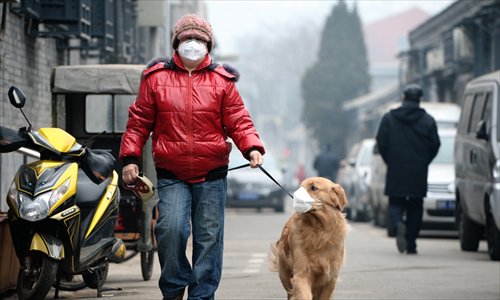HOME >> CHINA
Heavy smog to linger as plan enacted in vain
By Fang Yang Source:Global Times Published: 2014-2-24 1:18:01

A Beijing resident walks a dog on Sunday wearing a mask in heavy smog. Experts have warned the public to avoid outdoor activities as a mask will only offer limited protection. Photo: CFP
Persistent smoggy weather that covered about 15 percent of the country has triggered wide concerns over the efficiency of the government's emergency response plan for air pollution.
Heavy smog blanketed Beijing and Tianjin municipalities, as well as parts of Hebei, Shandong, Henan, Shanxi and Shaanxi provinces before the weekend. It is expected to linger until Thursday, the National Meteorological Center (NMC) said Sunday.
The Ministry of Environmental Protection has sent 12 inspection teams to these regions to review local government responses to the pollution and their implementation of the Air Pollution Control and Prevention Action Plan introduced in September 2013.
The teams will inspect major polluting industries to see if they suspended operations as requested, the ministry said, adding that any violations will be published.
Beijing raised its alert to orange, the second highest of the four-level system, for the first time on Friday and an emergency response was initiated which halted construction work and allowed no open-air barbecues in the city.
A total of 111 enterprises in Beijing were shut down or suspended operations, the Xinhua News Agency reported on Saturday.
Despite the measures, these regions are still choking from smog.
"When the emergency plan is activated, it means the pollution has hit a certain level, and the relief measures can only stop the situation from worsening," Ma Jun, director of the Beijing-based Institute of Public and Environmental Affairs, told the Global Times.
To better avoid persistent heavy pollution, Ma suggested a more proactive warning system.
"Meteorological stations and environmental authorities need to improve their forecast abilities and keep the public informed in advance," Ma said, adding that it will make the emergency measures more effective.
Experts also urged that those measures should be fully implemented by all relevant parties and individuals to ensure better results.
Ma suggested that when the emergency response is activated, the operation status of heavy polluting factories should be disclosed to the public to make sure they follow protocols, and people should also be able to find out their emissions statistics.
Ma's opinion was echoed by Wang Jinnan, vice president of the Chinese Academy for Environmental Planning.
"The public should be kept informed with all the information about the emergency response so that they can help monitor the implementation as well," Wang said.
While emphasizing local government responsibility for enforcing the measures, Wang suggested that the tasks should be assigned to different departments with specific liabilities.
"It will ensure a better emergency response when each knows how to perform its own functions," Wang added.
As the emergency response only serves as a temporary solution, experts called for readjusting industrial structure and shifting out heavy polluting industries to fight the environmental protection battle in Beijing, Tianjin and Hebei Province, where smog hit the most.
There are nearly 150 blast furnaces in Tangshan, North China's Hebei Province, out of the total 700 in the country, according to mysteel.com, a web portal for China's steel industry.
"An excessive concentration of administrative power has led to monopolies of economic resources, and caused intensive pollution sources," Pan Jiahua, director of the Institute of Urban and Environmental Studies at the Chinese Academy of Social Sciences, was quoted as saying by Economy magazine.
Pan suggested that by redistribution of resources, regions like Tangshan will not have to rely on a single industry and would gain other momentum even though it might lose certain economic advantages.
Wang Jinnan also believes that a reasonable layout of industries will help relieve the heavy pollution.
"Air pollution is a regional issue rather than a local issue," Wang said, adding that heavy polluting factories need to be moved to regions that have enough ecological capacity.
Posted in: Society